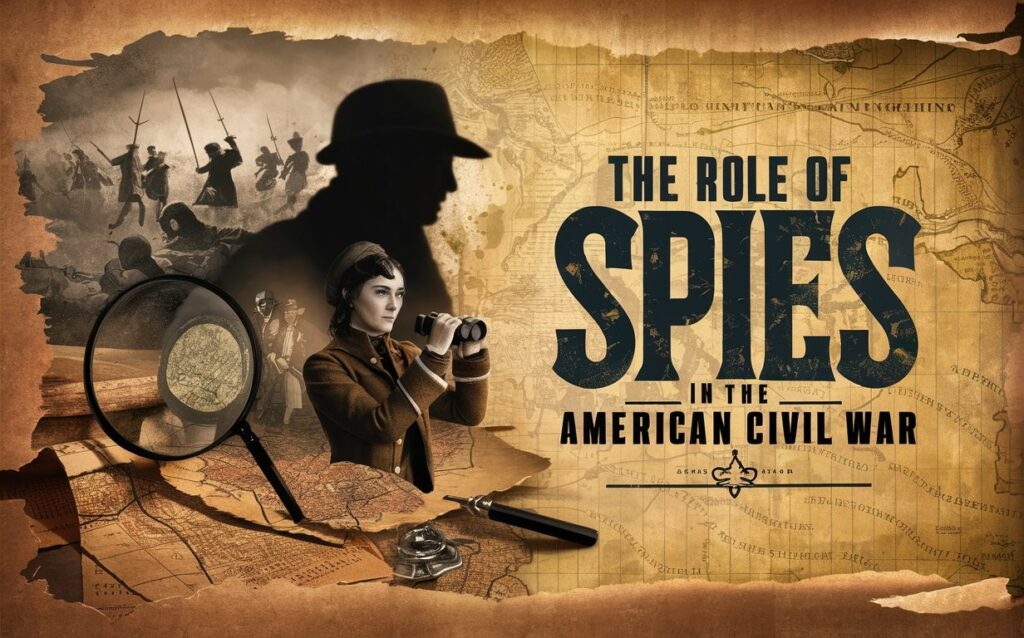The Role of Spies in the American Civil War

The American Civil War, fought between 1861 and 1865, was a defining moment in the history of the United States. While the conflict is often remembered for its epic battles, strategic military campaigns, and the transformation of the nation, one of the most critical—yet often overlooked—elements of the war was the role of espionage. Spies, operating on both sides of the conflict, gathered crucial intelligence, disrupted enemy operations, and shaped the strategies of Union and Confederate forces. The information they provided played a pivotal role in determining the outcomes of key battles and even the course of the war itself.
In this article, we will explore the role of spies in the American Civil War, focusing on their methods, their successes and failures, and some of the most notable individuals who worked in the shadows during this turbulent time.
Espionage in the Civil War: A New Era of Intelligence
The Civil War marked a turning point in the use of espionage. Though spies had been used in earlier conflicts, the scale of the Civil War and the technological advancements of the time—such as the telegraph, railroads, and photography—made intelligence gathering more vital than ever before. Spies operated in various capacities, from infiltrating enemy camps to intercepting communications, and their work was often shrouded in secrecy.
The Need for Spies: A War of Information
The Union and Confederate armies faced each other across a vast and divided nation, making it difficult to maintain a clear understanding of enemy movements and strategies. The Union’s goal was to preserve the Union and defeat the Confederacy, while the Confederacy sought to gain independence and establish its own nation. To achieve these aims, both sides needed accurate and timely information about the other’s plans and capabilities.
Spies provided that information by:
- Infiltrating enemy camps: Spies would sneak into enemy territory to gather intelligence, often by disguising themselves as civilians or prisoners of war. They could report on troop numbers, fortifications, and the movements of enemy generals.
- Intercepting communications: Spies often intercepted and decoded messages sent via telegraph or mail. The ability to decipher these communications could provide vital clues about upcoming battles or shifts in strategy.
- Reconnaissance and sabotage: Spies also played a role in physically scouting enemy positions, mapping terrain, and even sabotaging infrastructure like railroads, bridges, and supply lines to hinder the enemy’s ability to move or resupply.
The success of espionage during the Civil War depended on the ability of spies to blend in with civilians or military personnel, the trustworthiness of their intelligence, and the effectiveness of their handlers in utilizing the information they provided.
Notable Spies of the Civil War
Both Union and Confederate sides relied heavily on espionage, and many individuals became famous—or infamous—for their work as spies. Some were famous for their success in obtaining crucial information, while others became notorious for their daring missions.
Belle Boyd: The “Cleopatra of the Secession”
One of the most well-known Confederate spies was Belle Boyd, a Southern woman who became famous for her daring espionage activities. Boyd was just 17 years old when she began her spying career in 1861. Operating in Virginia, she frequently used her charm to gather intelligence from Union soldiers and officers, often by flirting with them or ingratiating herself into their confidence.
Boyd provided critical intelligence that helped the Confederate army. Her most notable contribution was warning General Thomas “Stonewall” Jackson of a planned Union attack, allowing him to counter the offensive. She was arrested several times by Union forces, but she continued her work as a spy, even managing to escape captivity on more than one occasion. Boyd became so famous for her espionage work that she was dubbed the “Cleopatra of the Secession” by Confederate sympathizers.
Harriet Tubman: The Spy Who Led Others to Freedom
Harriet Tubman, best known for her work on the Underground Railroad, also served as a spy and scout for the Union Army during the Civil War. Tubman used her extensive knowledge of the South to aid the Union cause, helping to gather intelligence and lead raids behind enemy lines.
One of her most significant contributions came in 1863, when Tubman worked as a scout and spy for Union General David Hunter during the Combahee River Raid in South Carolina. In this operation, she helped lead a successful raid that freed more than 700 enslaved people. Tubman’s ability to navigate Southern territory undetected made her an invaluable asset to the Union Army, and her intelligence-gathering efforts helped influence key military strategies.
Allan Pinkerton: The Head of the Union Intelligence Service
Another key figure in Union espionage was Allan Pinkerton, the founder of the Pinkerton National Detective Agency. Pinkerton was appointed by President Abraham Lincoln to serve as the head of the Union’s intelligence network. Under his leadership, the Union Intelligence Service (later known as the Pinkerton Detective Agency) conducted espionage operations behind Confederate lines.
Pinkerton’s most famous success was his discovery of a Confederate plot to assassinate President Lincoln in 1861, just before his inauguration. This intelligence allowed Union authorities to thwart the assassination attempt, which was to take place in Baltimore. Pinkerton also helped organize and manage a network of spies and informants, though his operations were sometimes controversial and not always successful.
James E. McGready: Confederate Spy Master
On the Confederate side, James E. McGready was one of the most successful and highly regarded spies. Known for his work in gathering intelligence in Union-controlled areas, McGready was instrumental in helping Confederate generals understand Union troop movements. His skills in espionage were so respected that Confederate President Jefferson Davis reportedly held him in high regard, and McGready was trusted with some of the most sensitive intelligence operations.
Espionage Networks and Methods
Both the Union and Confederate forces relied on extensive networks of spies, scouts, and informants to gather intelligence. These networks ranged from individuals working independently to organized groups within military units.
The Confederate Secret Service
The Confederacy had its own intelligence network known as the Confederate Secret Service, led by Thomas Jordan and later by Isaac H. Porter. This organization coordinated efforts across the South to gather information on Union troop movements, intercepted communication, and sabotage Union supply lines. The service was highly decentralized, and much of its intelligence-gathering took place in civilian areas, with local agents and residents working as informants.
One of the most notable achievements of the Confederate Secret Service was its success in infiltrating the Union Army. Confederate spies were often able to pose as Union soldiers or sympathizers, providing valuable intelligence to Confederate commanders.
The Union Army’s Intelligence Division
The Union Army established its own espionage network, primarily under the direction of Allan Pinkerton and other military officers. The Union Intelligence Division was responsible for running espionage operations, recruiting spies, and gathering information about Confederate troop movements and battle plans. The division used a combination of civilians, Union soldiers, and free African Americans as spies, and it relied heavily on coded messages and secret signals.
One of the most successful aspects of the Union’s intelligence efforts was its ability to intercept Confederate communications, including messages sent via telegraph. The Union also developed a system of underground railroads and secret routes for agents to travel through Confederate-held territory, making it difficult for enemy forces to detect their movements.
The Legacy of Civil War Espionage
The role of spies in the American Civil War was crucial to the success of both the Union and Confederate efforts. The information gathered by spies helped shape military strategies, prevent disasters, and ultimately contributed to the Union victory. Many of the spies who operated during the war faced immense danger and hardship, and their stories of courage and secrecy have become an important part of American history.
The Civil War also marked the beginning of more formalized intelligence operations in the U.S. military. The establishment of intelligence networks during the war laid the foundation for the future development of modern military espionage and intelligence agencies, including the creation of the Central Intelligence Agency (CIA) in the 20th century.
Though the work of spies in the Civil War was often shrouded in secrecy, their contributions were essential to the outcome of the conflict. Today, we remember them not only for their bravery but also for the crucial role they played in one of the most defining periods of American history.
Conclusion
Spies played an indispensable role in the American Civil War, providing critical intelligence that shaped military decisions, influenced battles, and contributed to the ultimate victory of the Union. The spies who operated in the shadows—whether as civilians, soldiers, or agents—were some of the unsung heroes of the conflict. Their work laid the groundwork for modern espionage practices and proved that the battle for information was just as important as the battle on the battlefield. The legacy of these spies continues to be an enduring and fascinating chapter in the history of the Civil War.



Post Comment